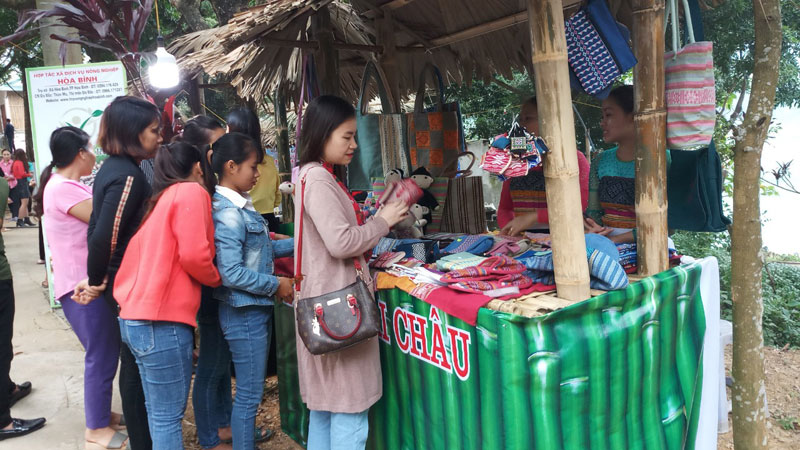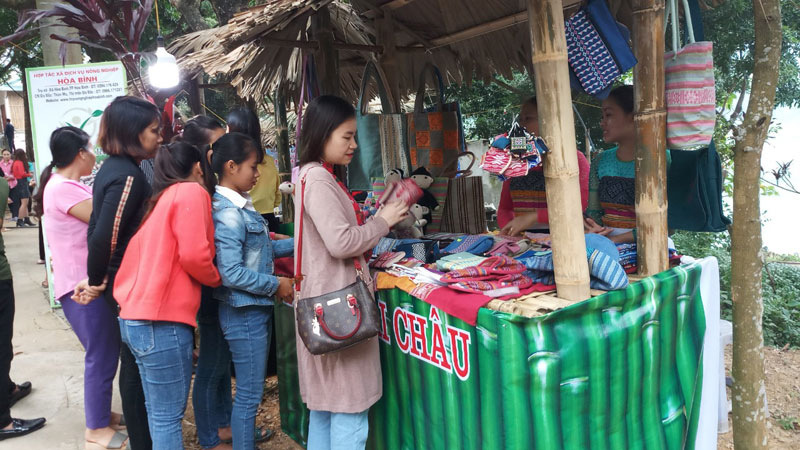
(HBO) - Brocade weaving of Thai ethnic people in Mai Chau district has been in existence for a long time. In the past, women made brocade to mainly serve the daily life of their families, themselves and as the wedding gifts. Nowadays, when tourism develops, the beauty and the cultural traditions of the nation are respected, preserved and promoted, the traditional weaving profession has been strongly restored.
 The products of Chieng Chau Cooperative of Brocade Weaving are
suitable for the taste of women, so they are always paid attention to.
The products of Chieng Chau Cooperative of Brocade Weaving are
suitable for the taste of women, so they are always paid attention to.
Brocade products of Thai ethnic people in Mai Chau in
general and Chieng Chau commune in particular have been on the market, becoming
the popular items for tourists and consumers.
Mrs. Vi Thi Oanh, the Director of Chieng Chau cooperative of
weaving brocade and tourist service says: In 2009, the cooperative was
established with 33 members. With the interest of all levels, appropriate
authorities and the provincial Union of Cooperatives, the members of the
cooperative have been attending the training courses on the transfer of the
technology of making new products and the natural dyeing techniques, marketing
activities, especially participating in trade exhibitions and trade fairs organized
in the province and in other provinces and cities throughout the country.
Thereby, it has been creating conditions for us to capture the market and build
a logo for the product.
At the same time, the cooperative has traded, signed the
contracts of goods supply, found a stable market for consuming products and
directly calculated the plans to invest and buy materials so that the women can
make the weaving brocade products. The Board of Directors has always been
looking for and creating many beautiful designs, which are consistent with the
consumers’ tastes. The outstanding products are woven scarves, tablecloths,
handbags of all kinds, shoes and slippers, diary covers, stuffed animals,
coasters for cups and dishes, seating cushions, pillows, souvenirs and so on.
These products always have a stable consumption market, especially in Japan,
France and some other countries.
The emulation movement "Hoa Binh joining hands to build new-style rural areas” has been widely spreading, becoming a driving force that motivates the localities to renew rural landscapes and improve the material and spiritual lives of the residents. In this movement, the people play a central role-both as the main implementers and direct beneficiaries of its outcomes.
In response to the global digital revolution, Hoa Binh Newspaper is transforming itself into a modern and multi-platform media hub, blending cutting-edge technology with a restructured newsroom and a new generation of tech-savvy journalists.
Hoa Binh province’s Association of the Elderly recently held a conference to review the project on expanding the inter-generation self-help club model until 2025.
In a move to implement Resolution No. 57-NQ/TW, issued on December 22, 2024 by the Politburo, which targets breakthroughs in science-technology development, innovation, and digital transformation, the Hoa Binh provincial Department of Health has issued a plan to roll out the "Digital Literacy for All” campaign within the local health sector.
An Nghia Commune (Lạc Sơn District) is one of the communes that achieved the tha standard of the national new rural area in 2018. Entering a new development phase, the commune is now trying to meet the criteria for the advanced new rural development. With the strong political will and the public consensus, the commune is gradually overcoming the challenges to reach this goal, aiming for the sustainable development.



 The products of Chieng Chau Cooperative of Brocade Weaving are
suitable for the taste of women, so they are always paid attention to.
The products of Chieng Chau Cooperative of Brocade Weaving are
suitable for the taste of women, so they are always paid attention to.